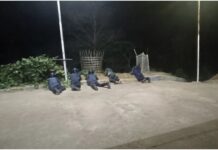THE Bangla-speaking population in general, and the Bengalis of Bangladesh in particular, [The Bangla-speaking people, as a ‘truncated speech community’, live in different parts of the world. Of them, more than 150 million live in Bangladesh. More than 80 million live in different states of India including West Bengal, Tripura, Assam, Bihar and Manipur. Besides, Bengalis have a significant presence in the United Kingdom, the United States of America, Canada and Australia] have reasons to take pride in the fact that the United Nations Educational, Scientific and Cultural Organisation recognised in September 1999 Ekushey February, February 21 of Gregorian calendar that is, as ‘International Mother Language Day’. The reason is simple. It was the Bengalis of Bangladesh who laid down lives on this historic day in 1952 while fighting for Bangla, the mother tongue of the Bengalis, to be a state language of erstwhile Pakistan in 1952.
UNESCO’s proclamation of February 21 as International Mother Language Day was aimed at ‘promoting and preserving linguistic and cultural diversity, and multilingualism, in order to foster a culture of peace, harmony, cross cultural dialogue and mutual understanding’ among populaces having different histories and heritages across the world. Later, the general conference of UNESCO resolved in October 1999 to observe February 21 as International Mother Language Day every year in the member states and at UNESCO headquarters, ‘with a view to pursuing the organisation’s work in favour of linguistic and cultural diversity and multilingualism in all fields of competence’ on the one hand, and on the other hand, ‘recognizing the unprecedented sacrifice made by Bangladesh for the cause of mother language on 21 February 1952’. This is, indeed, a great honour accorded, and recognition given, to the people of Bangladesh by a world body for the democratic resistance they had successfully put up against the ruling class of the erstwhile Pakistan that denied the legitimate right to have Bangla, the mother language of the Bengalis, as a state language.
The recognition did not come automatically; it was wrestled out from the United Nations through a series of politico-cultural activism at the global level that began in a small rural town of Bangladesh. It was ‘a group of theatre activists of Gafargaon’, a sub-district under Mymensingh, which ‘demanded on February 21, 1997 that Ekushey February be accorded international recognition’. In its journal, Argha (Offerings), published to commemorate Ekushey in 1999, the group editorially iterated its demand for Ekushey to be declared ‘internal mother-tongue day’. They also brought out a procession, with placards in hand that said ‘Want international recognition of Ekushey’. They also posted bills on the walls and stickers on buses and trains in which similar slogans were inscribed. [Mohammad Hannan, Ekushe February Kamon Kore Antarjatik Dibas Holo (How February 21 Became an International Day), in Matribhasha Sangkat O Matribhasha Andolon (Crises of Mother Tongue and Movement for Mother Tongue), ed. Dr Prothama Raymondol, Annopurna Prakashoni, Kolkata, 2004, p 92] Notably, Gafargaon was the birthplace of Abdul Jabbar, one of those killed in police firing during the demonstration of the Bengalis on February 21, 1952 for Bangla to be made a state language of Pakistan. That the ordinary people of Bangladesh started nurturing the idea of securing ‘international recognition’ for the great national event having implications on all the dominated languages of the world got evident in the fact that one Inamul Huq from Chuadanga, a distant district town of Bangladesh, wrote a letter on March 25, 1998 to Kofi Annan, then secretary general of the United Nations, requesting the latter to make arrangement for giving ‘international recognition’ to Ekushey February. [ibid]
However, the most effective initiative came on March 29, 1998, again, from a couple of ordinary Bengalis living in Canada. Proud of the legacy of Bangla language movement, the two Bangladeshis, Rafiqul Islam and Abdus Salam, persuaded some young men and women from six other countries to launch an ‘international’ platform with a view to persuading the United Nations to fight against the ‘serious crises and threat’ that the mother languages of many nations and/or communities’ are exposed to. The two also convinced them about the importance of securing international recognition for February 21 as a symbol of successful struggle of the people to protect their mother tongue. They called themselves the Mother Language Lovers Group. [The ten-member multinational group included two persons whose mother tongue is Filipino, two English, one German, one Cantonese, one Kachchi, one Hindi and two Bengalis.] They eventually wrote to the secretary general of the United Nations describing the great role that the Bengalis had played in ‘protecting their mother language from serious crisis’ relating to its existence and proposed that the UN should declare an ‘International Mother Language Day’ for the sake of protecting the languages facing various crises. The group proposed that February 21, the day on which the Bengalis fought against the neo-colonialist police of Pakistan and sacrificed their lives for their language in 1952, be declared International Mother Language Day. The group received a favourable response and a procedural guideline from the secretary general’s office to go ahead with the issue. That was the beginning of the official process to get the UN recognition for Ekushey February. The process, which included involvement of the government of Bangladesh to move an official resolution, ended on November 16, 1999 with the general conference of the UNESCO adopting a resolution to the effect that the member states of the United Nations and UNESCO would every year observe February 21 as International Mother Language Day. [Bangladesh officially moved the resolution in the general conference of the UNESCO, with Saudi Arabia being a co-mover, while Sri Lanka, India, Pakistan, Iran, Indonesia, Philippines, Egypt, Syria, Oman, Benin, Russia, Italy, Lithonia, Belarus, Micronesia, Ivory Coast, Honduras, Bahamas, Dominican Republic, Papua New Guinea, Gambia, Vanuatu and Comoros supported the resolution]
With the UN recognition of the language movement of the Bengalis, and the adoption of February 21 as International Mother Language Day, the globalisation of Ekushey has taken place. While the Bengalis in general have reasons to be proud of the positive impact of the internationalisation of Ekushey, the politically conscious and democratically oriented sections of the Bengalis have reasons to be concerned about a possible negative implication of such globalisation by the United Nations. While the UN these days mostly stands for the exploitative political and economic world order of the day, for the people of Bangladesh Ekushey not only stands for the democratic struggle for upholding mother tongue but also remains the most effective symbol of public protest against all kinds of exploitation and discrimination — imperialist, colonial, neo-colonial and nationalist. The democratic globalisation of Ekushey, therefore, calls for protecting and promoting the inherent spirit of the people’s struggle against all kinds of injustices in Bangladesh and beyond.
Source: New Age









